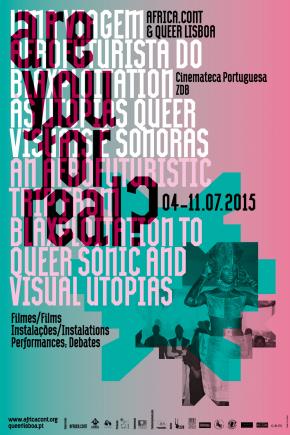are you for real?
We resume our exploration of African queer cinema, thus extending the Queer Focus on Africa cycle featured in the Queer Lisboa festival last year. This time, we’re leaving Africa proper behind for the American and British world, thus reiterating one of our premises… the extension of “African” and “African-ness” that is part of AFRICA.CONT, a cultural force abroad in the world, much as a current in the ocean: integral to the whole but with movements and temperatures all its own - in the beautiful imagery of Achille Mbembe. We are certainly eager to explore the realities that this current embodies in its Central and South American, European and Asian diasporas.
 We go from one world, Africa, where dissident genders and sexualities live in African and predominantly black societies that more often than not exclude them; to another world, one in which the queer way of life of those of African descent is embedded in a society which, since the second half of the 20th century, has defined and explored the very movements and designations that define these dissident sexualities and genders: from the “homosexual” and homophilic movements, to “gay” and the multiple fronts of gay liberation, from gay to lesbian later, and then to “queer” and today’s various forms of queer agency and subjectivity. Globalization processes made these ideas better known (and imitated) to a greater or lesser extent the world over, and by ourselves too; which however does little to aid the task of understanding the complexities of contexts in which these films and forms of expression are produced and seen, nor in making sense of any of those we will be watching.
We go from one world, Africa, where dissident genders and sexualities live in African and predominantly black societies that more often than not exclude them; to another world, one in which the queer way of life of those of African descent is embedded in a society which, since the second half of the 20th century, has defined and explored the very movements and designations that define these dissident sexualities and genders: from the “homosexual” and homophilic movements, to “gay” and the multiple fronts of gay liberation, from gay to lesbian later, and then to “queer” and today’s various forms of queer agency and subjectivity. Globalization processes made these ideas better known (and imitated) to a greater or lesser extent the world over, and by ourselves too; which however does little to aid the task of understanding the complexities of contexts in which these films and forms of expression are produced and seen, nor in making sense of any of those we will be watching.
“I experience crap from both angles. I can’t say one hurts less than the other if you find yourself racially profiled on one hand, and then made to feel like an outcast in a gay club – or trying to get into one!” This is the testimony of the African-British writer and activist Vernal Scott, commenting on a survey conducted by the FS organization and recently published in their FS Magazine. Black lesbians and gays are effectively subject to various forms of discrimination: both racial and homophobic by the hegemonic white, but also stigmatization by their heterosexual black brothers; racial discrimination also exists within the white-majority lesbian and gay community. It is important to consider both dimensions, sexual and racial, as intersecting. And to these one can add further dimensions which also intersect: gender, class, ethnicity, and spirituality.
Our curators, Ricke Merighi and Pedro Marum, suggest a queer trip through a sample of American and English black cinema from the three decades between 1970 and 2000. This is a queer trip because it displays queer images, but also because the programme concept itself adopts a queer outlook - thoroughly critical of all forms of normativity, of all identities and boundaries that limit human experience. To them, and to João Ferreira, our thanks.
A series of experimental documentaries and video-essays connects, horizontally, the creations of two avant-garde black cultural movements, of American origin, both still nameless at inception during the first half of the 1970s. One, Blaxploitation, mainly cinematic, albeit with a very strong musical element, heralds the birth of the first independent black movies in the USA. A cinema in which the characters boldly adopt the powerful stereotypes foisted by whites on blacks - the “Black Macho”, “pimp”, “criminal”, “dangerous”, “childish”, “wizard” and of course the black “Jezebel”, sexually out-of-control, promiscuous and immoral. The other movement redraws relationships between music, fashion, science, science and historical fiction, fantasy, spirituality, the visual arts, and cinema itself; spawning one of the most imaginative re-definitions and re-imaginings of the black Atlantic experience – revisiting forced displacement, cultural alienation, and being the American Other, in the past, present, and future, reworking all of this through a temporal continuity which questions what came first. At the heart of this cultural sensitivity, of what is known as Afrofuturism, there is an unexpected and surprising analogy between “slave ship” and “spacecraft”. Are you for real?